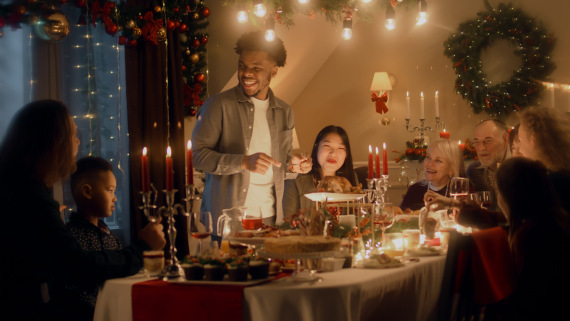Tips to Adapt Holiday Traditions for Mesothelioma Patients

The Harris Poll conducted a survey from November 25-27, 2024 on behalf of the American Psychological Association about stress among adults in the U.S. As the APA reports, “Only 16% of adults said they do not experience stress during the holiday season.”
Holiday stress is very common as people worry about finances, busy schedules, preparations and family dynamics. This stress is often amplified when you or a loved one has mesothelioma.
It can be challenging to participate in our usual holiday traditions whether we’re celebrating Christmas, Hanukkah, Kwanzaa or New Year’s Eve. Being immunocompromised and having mesothelioma symptoms or treatment side effects can change how we’ll experience the holiday events and family gatherings we always enjoyed.
Maintaining family traditions can have significant benefits during times of stress. As the APA noted in reference to a 50-year review of research, “The review finds that family routines and rituals are powerful organizers of family life that offer stability during times of stress and transition.” This can be particularly important when coping with a diagnosis.
This time of year is typically a time of holiday traditions. When you have a serious diagnosis such as mesothelioma, the holiday season can feel very different from years past. But, it’s possible to engage in some traditions if you and your loved ones can be flexible and focus on what’s really important to you this holiday season.
Identify What’s Most Important to You
Engaging in traditions brings a sense of connectedness to our history, our culture, our faith or to our families. It can be helpful to ask ourselves what is most meaningful or valuable to us about our holiday traditions.
How can we make space for what’s most important to us? And how can we do so while respecting our needs as we cope with mesothelioma?
Prioritizing Holiday Plans
- Do we enjoy connecting with our families and friends?
- Are the holidays a time to practice our faith or connect with our congregation?
- Do we enjoy hands-on activities like holiday crafts or making treats?
Traditions, customs and activities can be passed down through generations or we may create our own new traditions throughout our lifetime. Most people treasure their family traditions. With mesothelioma, this is an opportunity to adapt what we love most and create new traditions.
Adapting Family Traditions for Mesothelioma Patients
Customs may need to be adapted if someone is immunocompromised and needs to avoid traveling, crowded holiday events and religious services or family gatherings. Changes in appetite can alter how we enjoy food. Fatigue can impact our ability to host events, shop, prep or cook. This is where flexibility and creativity can be helpful.
Idea Starters for Adapting Holiday Traditions
- Ask for help: Adapting sometimes also means being ok with asking someone else to host or accepting help with holiday shopping.
- See the lights: Instead of attending big public events such as tree, menorah or kinara lightings, get cozy in the family car and drive around admiring the lights.
- Share recipes: If bake swaps or hosting a big dinner are your usual traditions, consider sharing recipes special to your family. Gifting treasured recipes can also help if shopping is tough right now.
- Try new recipes: If tastes change or nausea is a problem, a family member can adapt favorite recipes or try preparing new healthy holiday recipes with a twist for mesothelioma patients.
- Tune in to services: If crowded religious services aren’t an option, try visiting at a different time of day or tune in online or on TV. Some houses of worship will also come to you, for example, scheduling a priest, minister or deacon to give communion in your home.
With some creativity and flexibility, it’s possible to participate in holiday traditions or even make some new ones. While this year’s holidays may not look exactly like those of years past, it can still be a special celebration with the people you love.